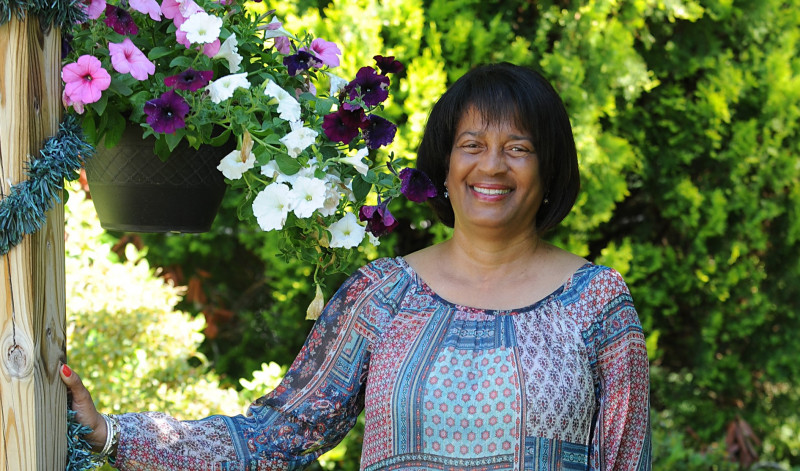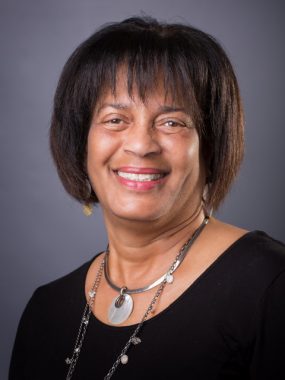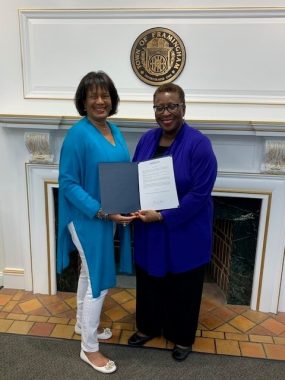Advocate Encourages Community Not to ‘Live in Silence’

Photo courtesy of Glenda Thomas
A professional portrait of Glenda Thomas.
Myasthenia Gravis (MG) Awareness Month may be wrapping up, but advocate Glenda Thomas is just getting started.
Diagnosed at age 60 with the rare disease form known as MuSK MG, which attacks the muscle-specific tyrosine kinase receptors and can prevent muscles from contracting, Thomas now spends her waking hours promoting the needs of rare disease communities.
She serves on the patient advisory board of the MG Foundation of America (MGFA), is one of two recently appointed patient advocates to the Rare Disease Advisory Council of Massachusetts, and sits on the Beth Israel Deaconess Medical Center family and caregiver advisory board.

Glenda Thomas in a portrait photo. (Photos courtesy of Glenda Thomas)
Her work on these boards overlaps as she raises awareness for MG and the broader rare disease community, which encompasses more than 7,000 disorders. Increased awareness leads to better education and health outcomes for patients, she said.
“As we look at how we attack certain components of that outreach, we’re helping each other,” Thomas said. One idea she’s planning to pitch as an advocate is establishing a secure TV channel that patients can turn to when they need information about their condition. That channel would be an alternative to computers, which older and disabled patients may find challenging.
Part of her goal is making sure people, whether they live in urban or rural areas, learn about rare diseases, get properly diagnosed, and receive the right treatment. Thomas also said she doesn’t want a high cost of treatment to be the reason patients forgo medicine that could improve their quality of life.
The online interconnectedness brought on by social distancing because of the COVID-19 pandemic has, in a way, helped that process. Increased access to educational webinars, telehealth, and reports from disease communities have made it easier for people in rural and lower-income areas to learn about a rare disease like MG and take steps to improve their health.
“The more that I think we can get people to start to share, and come and listen to what other people have to say, so they can learn more about their illness, the better,” Thomas said. “I’m trying to reach out so we can get an informed community.”
When Thomas was diagnosed in 2013, she hadn’t heard of MG. She hopes that in the future people will push for a diagnosis more quickly than she did, and the disease won’t be completely foreign to them. Like many others in the rare disease community, finding out she had MG was a diagnostic odyssey.
Thomas’ symptoms started around 2012, and her mother’s Alzheimer’s doctor — noticing her droopy eyelids — suggested she see a neurologist. She hesitated, and the problem progressed until Thomas could barely see well enough to drive down a two-lane highway. She underwent surgery in early 2013 to lift the eyelids, only to have her neck muscles begin to weaken. Physical therapy also was not helping, and she made an appointment with a neurologist after her spine doctor also recommended seeing one.
That specialist discussed her case with colleagues, and she was advised to undergo a full clinical examination. The generalized MG test came back negative, but an antibody test uncovered her MuSK MG.

Glenda Thomas with Yvonne Spicer, the mayor of Framingham, Massachusetts.
Up until her diagnosis, Thomas said she was on her way to an MG crisis without realizing it. She dropped weight, going from a size 12 to a size two. Standing up and walking became difficult. She started ordering tenderloin instead of steak at restaurants because it was easier to chew. At her son’s football game, she tried to yell but could barely raise her voice above talking level.
Thomas’ next challenge was finding an effective treatment. Two medicines typically given to MG patients — prednisone and Mestinon (pyridostigmine) — weren’t working for her, she said. Eventually she settled on a non-MG-specific treatment called Rituxan (rituximab), which acts by lowering the number of certain immune cells.
Going back and forth with a doctor to arrive at the best personal treatment is the type of advocacy that Thomas is trying to convey when she interacts with others with MG or the broader rare disease community. Doctors, she said, see only a sliver of all that makes up an individual’s life, especially when it comes to rare diseases.
“To the patients, I’m saying advocate for yourselves because your doctors know you when you come in for a crisis, but don’t know what you were doing before that crisis,” Thomas said.
Being appointed by the governor to be part of the Rare Disease Advisory Council of Massachusetts, along with 27 other stakeholders, including state senators, members of patient groups, pharmacists, and doctors, is yet another step for Thomas. While the council has yet to hold its first meeting — it was created by the state legislature on Jan. 2 — she is poised to tackle issues during her three-year term, such as adding more disorders to required newborn screenings and lowering the cost of rare disease medications.
Beyond her official roles advocating for MG, Thomas is working to find a cure for her disease. She networks with four major pharmaceutical companies in the Boston area, one of which is UCB, which nominated her for the advisory council position. She also is continually making people aware of the disease wherever she goes, hosting a 2019 “MG Awareness Month” fundraiser dinner that was recognized by the mayor of her city, Framingham, and another in Boston.
She’s encouraged by the continued growth of the understanding of the disease, which was first documented by an Oxford physician in 1672. Treatments date to the 1930s, and the U.S. Food and Drug Administration (FDA) approved Mestinon as the first MG treatment in 1955. More than 60 years elapsed before the next FDA-approved treatment for generalized MG arrived — Soliris (eculizumab), by Alexion Pharmaceuticals — in 2017.
Thomas attributes the success she’s seen in her advocacy journey to her determination to always speak up.
“Don’t live in silence, because you never know what doors will open for you, and who knows what those doors could be,” Thomas said.






